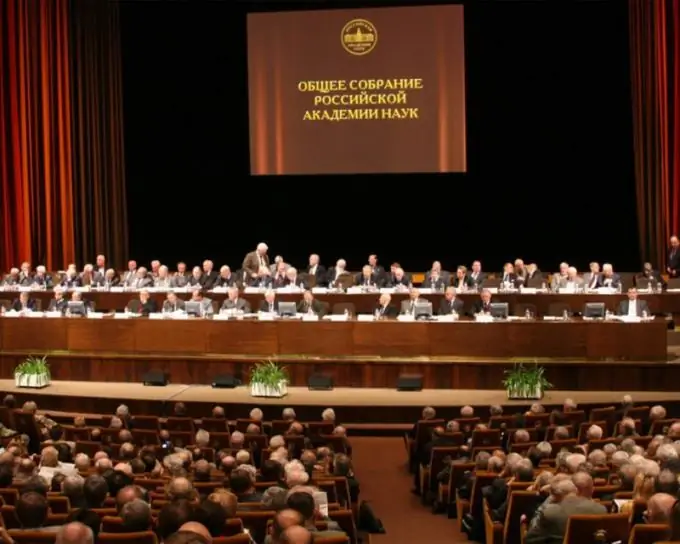- Author Nora Macey macey@family-relation.com.
- Public 2023-12-16 10:17.
- Last modified 2025-01-23 08:47.
When the word "professor" or "academician" is pronounced, a gray-haired scientist, certainly a doctor of sciences, who knows about his scientific field, if not all, then almost everything, immediately appears.

To a certain extent, this stereotypical image corresponds to reality. Both the professor and the academician are scientific titles, the path to which is difficult and long, therefore they reach such a position, as a rule, at a respectable age. But you can be a professor at any university or research institute, and an academician only at the Academy of Sciences.
Professor
A professor is both a scientific title and a position, the way to which lies along a certain "career ladder". The title is inseparable from the person, they are appointed to the position. A candidate of sciences can take the position of assistant professor of the department, but he can remain an assistant - or become such if he moves to work in another university. In a few years he will receive the title of assistant professor, and then he will be able to apply for an assistant professor position in any university.
The next stage of a career is the position of professor of the department. There is no explicit prohibition on the appointment of PhDs to this position, but it is usually held by PhDs. Just as in the case of an associate professor, after several years of work in this position, a scientist can receive the title of professor, and for this a doctoral degree is already required. The professorial title gives the right to head the department.
Academician
Before the October Revolution of 1917, any student of an academic educational institution, for example, a university, was called an academician in Russia. In the Soviet era, this title was officially introduced in a different meaning, in which it is still used in the Russian Federation.
An academician is a full member of the Academy of Sciences - an organization that unites scientists and organizes the activities of the scientific community. Such an academy should not be confused with a higher educational institution bearing a similar name - for example, the Russian Academy of Music named after the Gnesins.
In theory, it is not necessary to be a professor in order to become an academician, but in reality this honor is most often awarded to scientists who already have a professorship.
The first step to becoming an academician is to be elected a Corresponding Member. For outstanding scientific achievements, a scientist is elected a corresponding member by secret ballot, which takes place in the corresponding department of the Academy, and then the general meeting of the Academy of Sciences approves his election. Academicians are elected from among the corresponding members at the general meeting of the Academy of Sciences, and this title is awarded for life.
Currently, there are many organizations that call themselves academies. Some of them - for example, the International Academy of Energy Information Sciences - have nothing to do with real science. Their members also call themselves "academicians", but they have no right to do so.
Only members of state academies can carry the title of academician. There are six of them in Russia: the Russian Academy of Sciences (RAS), the Russian Academy of Medical Sciences (RAMS), the Russian Academy of Education (RAO), the Russian Academy of Arts (RAA), the Russian Academy of Architecture and Construction Sciences (RAASN) and the Russian Academy of Agricultural Sciences (RAAS)).






